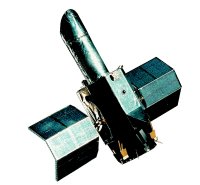Spacecraft
 |
|
The IUE spacecraft |
Dimensions
The IUE satellite measured 142 × 422 cm and had a launch mass of 671 kg (122 kg science, 237 kg apogee boost motor).
Payload
The telescope had an aperture of 0.45 metres and had four ultraviolet cameras on-board with a wavelength range of 155 to 310 nanometers: one primary long wavelength camera, one primary short wavelength camera, and a backup for each.
Satellite configuration
IUE employed a 1.45 m-diameter hexagonal-prism bus configuration with telescope assembly along the main axis, and fixed solar wings extending from opposing faces. Most of the high-power electronics were mounted in the main equipment bay at the base, near the passive thermal louvers, while the experiment electronics and attitude control elements were on the upper equipment platform.
Attitude and orbit control
IUE accomplished 3-axis control with 6 gyroscopes. Spacecraft coarse pointing with three reaction wheels (one spare has never been used in orbit), precision pointing (<1 arcsec. stabilisation over 24 hrs.) with Fine Error Sensors (2-axis star trackers using the telescope optics; 0.27 arcsec resolution in 16 arcmin FOV), fine/coarse Sun sensors and 8×9 N + 4×22 N hydrazine thrusters (27.3 kg hydrazine in 6 tanks) for momentum dumping and orbit adjustment.
Power system
424 W BOL/28 Vdc was provided by two fixed 3-panel arrays (210 W required) carrying 4980 2×2 cm Si cells. This degraded after 18 years in orbit to 40%. Two 6 Ah nickel cadmium batteries (17 cells each) provided support during times when more power was needed than was supplied by the solar array - for example during solar eclipses.
Communications and data
IUE used a 1.25-40 kbit/s 2.25 GHz 6 W S-band (circular polarisation) downlink, with fixed and reprogrammable formats. 139 MHz VHF was used for telecommand.
Operations Summary
A final report of the spacecraft operations (ESA SP-1215, 1997) is available online and can be accessed through the related publication on the right-hand side.
